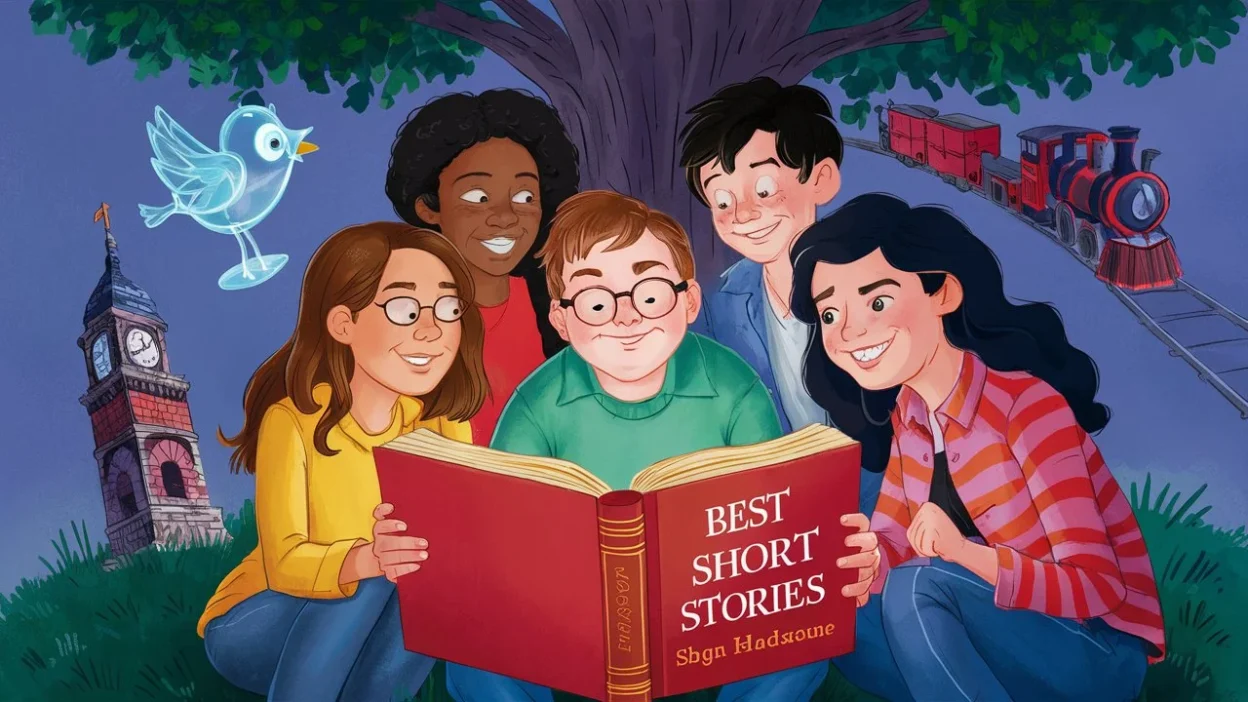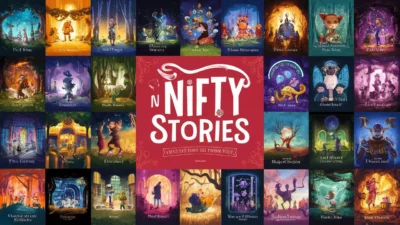Short stories are the heartbeat of quick yet powerful storytelling. For readers who crave depth without long hours of reading, the best short stories are perfect. In 2025, these tales are hot, trending, and tailored for people who want engaging narratives with life lessons.
Whether you’re an adult reader or looking for best short stories for middle school, this collection delivers timeless charm, meaningful morals, and easy-to-follow writing. These stories are designed for both casual readers and literature lovers who want to enjoy the top tales without overwhelming detail.
Story 1: The Forgotten Watch
Oliver found an old pocket watch in his late grandfather’s drawer. It was tarnished, but when he wound it, the ticking felt alive. Curious, he carried it around and noticed something strange—each time he checked the time, the world seemed to pause for a brief second.
At first, Oliver used it for small things: catching the bus, finishing his morning coffee, or sneaking extra minutes of sleep. But soon, he became greedy. He paused moments to cheat in card games, finish office reports, and avoid difficult conversations.
One evening, during dinner with his girlfriend, he paused the world to avoid answering her question about marriage. Yet when he restarted time, she wasn’t there. Neither was anyone else. The city was frozen, unmoving, lifeless.
Oliver panicked. He twisted the watch back and forth, but nothing changed. The world remained still, as though time itself had abandoned him. He realized too late that he had broken the very flow of life.
Now, Oliver sits alone, trapped in a silent, unmoving world with only the ticking of the watch for company.
Moral: Greed for control can rob us of life’s natural flow.
Story 2: The Librarian’s Secret
Amira worked at a dusty town library, where visitors were rare. One night, while shelving old books, she discovered a hidden door behind a broken shelf. The door led to a glowing room filled with journals written by strangers—yet each one recorded the future of a specific person.
Curious, she opened one with her own name. It described her life until that very night—then the pages turned blank. Terrified, she closed it.
She spent weeks sneaking into the secret room, reading others’ fates. Some were beautiful, some tragic. She debated telling the townspeople but feared chaos.
One day, she opened her book again. The next page appeared: “She tells the truth, and the library vanishes.” Trembling, Amira gathered the townspeople and revealed the secret.
The moment she finished, the library collapsed into dust. When the dust cleared, only Amira remained—alone, with no town, no people, no library.
Moral: Knowledge without wisdom can destroy everything.
Story 3: The Painter of Sunsets
Leonardo, a struggling painter, loved sunsets more than anything. He painted them daily, trying to capture their fleeting magic. But no matter how hard he tried, people mocked his work.
One evening, an old man visited his studio. “You paint beautifully,” he said. “But you’re chasing a moment instead of living it.” He handed Leonardo a strange brush.
The next day, when Leonardo painted with it, the sunset in his canvas shimmered and became real. People from the village gathered, mesmerized by the beauty of a living sky on canvas. His fame spread quickly, and wealth followed.
Yet Leonardo soon realized he no longer admired sunsets in nature. He was too busy painting them for profit. His joy faded, and the brush grew heavier each day.
One morning, the brush snapped, and all his paintings turned gray. The real sunset glowed outside, but Leonardo couldn’t feel its beauty anymore.
Moral: True beauty is meant to be lived, not owned.
Story 4: The Last Train
Evelyn missed her usual train after work and had to wait for the last one of the night. The station was nearly empty, and the silence felt heavy. When the train finally arrived, she noticed the passengers were unusually quiet, staring blankly ahead.
She sat down beside a woman who clutched a faded photograph. Evelyn tried to start a conversation, but the woman only whispered, “We’re all waiting to arrive.”
As the train sped through endless tunnels, Evelyn grew uneasy. She glanced outside—there were no cities, no stations, only darkness. The conductor finally appeared and asked for her ticket. When she handed it over, he paused. “You’re not supposed to be here,” he muttered.
Panicked, Evelyn stood up, and suddenly the train screeched to a halt. She stumbled onto a platform she didn’t recognize. When she turned back, the train and its passengers were gone.
The next morning, Evelyn read the news: there had been a deadly train accident that very night.
Moral: Sometimes fate gives us a second chance—don’t waste it.
Story 5: The Music Box
As a child, Daniel’s grandmother gave him a tiny music box. It played a sweet lullaby that comforted him whenever he felt afraid. After she passed away, the music box stayed hidden in his attic for decades.
One stormy night, Daniel—now old himself—found it again. When he wound it up, the melody filled the air, but something unusual happened: the sound brought back memories so vividly that he felt like he was reliving them.
He saw himself as a boy, sitting in his grandmother’s kitchen, smelling fresh bread, hearing her laugh. Tears filled his eyes. He kept winding the box, revisiting birthdays, family dinners, and quiet moments he had long forgotten.
The next morning, his neighbor found Daniel peacefully in his chair, the music box still playing softly beside him.
Though his body was gone, a smile rested on his face—as if he had joined those memories forever.
Moral: Memories are the true treasures of life.
Story 6: The Candle Maker
In a quiet village, there lived a candle maker named Sofia. Her candles weren’t ordinary—they never burned out. People traveled far and wide to buy them, believing they brought luck and protection.
But one night, a beggar knocked on her door, asking for a candle. Sofia, tired and greedy, refused. “I don’t give them for free,” she said coldly.
The beggar smiled sadly and left. That night, every candle in town flickered and died. Darkness swallowed the village, and fear spread quickly. The townspeople stormed Sofia’s shop, begging for light, but her shelves were empty.
The beggar returned the next day, revealing himself as a guardian spirit. “Light was a gift, not a commodity,” he said. With that, Sofia’s hands turned to wax, and she melted into a candle that burned alone at the village gate.
Her flame guided travelers for years—but she never left her post again.
Moral: Greed turns gifts into curses.
Story 7: The Clock Tower
In the center of a bustling city stood an old clock tower. Everyone relied on it for time, but no one knew who maintained it.
One night, a curious boy climbed the tower and discovered an old man working tirelessly, winding gears and polishing bells. “Why do you do this?” the boy asked.
The old man smiled. “If the tower stops, people lose their rhythm. I give them order without them ever knowing.”
Years later, the boy grew up and moved away. When he returned decades later, the tower had stopped, and the city felt chaotic. He climbed again—only to find the old man’s tools neatly placed, but the man himself gone.
Realizing the importance of unseen dedication, the boy took up the work. The clock soon ticked again, and the city’s life regained harmony.
Moral: Silent service often holds the world together.
Quotologi.com is your new home for meaningful quotes that inspire your day, lift your mood, and touch your heart.
Story 8: The Glass Bird
Mira bought a delicate glass bird from a market stall. The vendor warned her, “Handle it with care—it’s alive in its own way.”
Amused, Mira placed it on her shelf. At night, she swore she heard faint chirping. Over time, the bird grew brighter, glowing with light whenever she was kind to others. But when she acted selfishly, the glass dulled.
One day, Mira shouted cruel words at her friend. That night, the bird cracked. Panicked, she tried to mend it, but the pieces slipped through her hands. In the morning, the bird was gone, leaving only a shard with her reflection.
Mira kept that shard forever, a reminder that beauty thrives only when nurtured with kindness.
Moral: Kindness is the true keeper of fragile beauty.
Story 9: The Silent Street
Every evening, Sam walked home through an abandoned street. Though eerie, it was faster than the crowded main road.
One night, he heard footsteps behind him. He turned, but no one was there. The footsteps grew louder each night. Finally, he shouted, “Who’s there?”
A whisper answered, “We’re those you’ve ignored.” Shadows appeared—neighbors he had dismissed, friends he had betrayed, chances he had wasted. They followed him silently until he reached the end of the street.
The next morning, Sam woke determined. He called old friends, helped his neighbors, and embraced opportunities. Strangely, the footsteps never followed him again.
Moral: Ignored responsibilities return to haunt us until we face them.
Story 10: The Writer’s Dream
Lena dreamed of becoming a famous writer but never finished a single story. Every night, she dreamed of characters waiting for her, begging to be written.
One evening, exhausted, she scribbled down a short tale before bed. That night, her dream characters cheered, finally alive. She continued writing daily, and each dream became brighter, filled with voices thanking her.
Years passed, and Lena’s stories touched countless readers. Yet in her final dream, one character said, “You gave us life, now join us.” Smiling, Lena stepped into her dream world and never woke up.
Her books remained, but so did the feeling that Lena was still living within them.
Moral: Creation outlives the creator.
Conclusion
These 10 best short stories of 2025 prove that powerful lessons don’t need endless pages. They are hot, trending, and crafted for adults and younger readers alike, including those seeking the best short stories for middle school.
From haunting mysteries to timeless morals, these tales show why short fiction continues to inspire across generations. Whether you’re exploring life, memory, kindness, or destiny, the best short stories remain your gateway to meaning in minutes.




